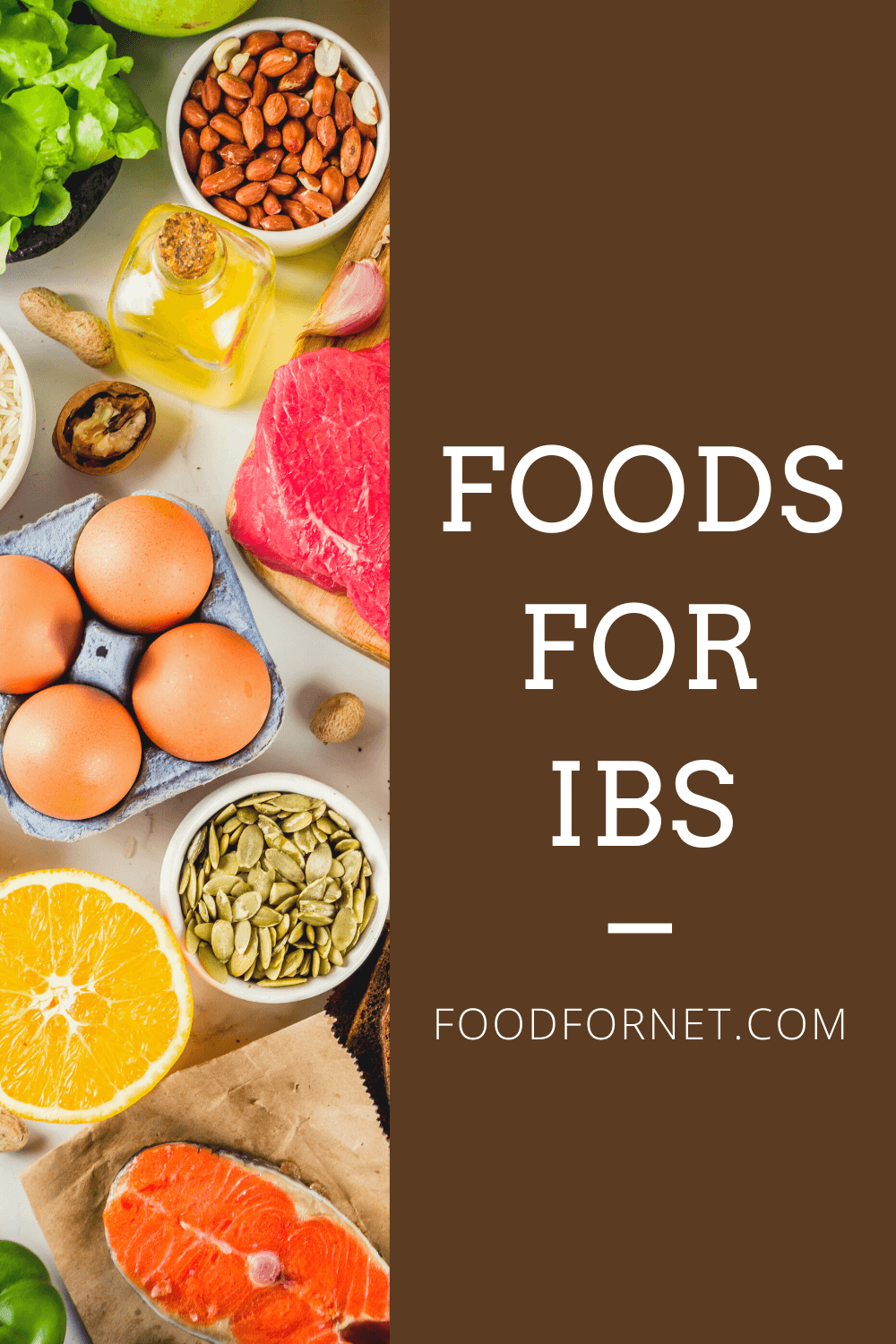
Irritable bowel syndrome, or IBS for short, is a frustrating condition that can result in gas, abdominal pains, bloating, and problems like diarrhea and constipation. While the cause of the condition is not known, IBS symptoms often emerge after eating. This means that people are often able to reduce their IBS symptoms by paying close attention to the foods that they eat, and there are plenty of foods for IBS that can avoid or help mitigate those symptoms.
The most common recommendation is to focus on a low FODMAP diet. FODMAP is an abbreviation for fermentable oligosaccharides, disaccharides, monosaccharides, and polyols. The simplest way to consider these is as a collection of short-chain carbohydrates that can ferment.
Research has found that FODMAPs tend to be absorbed poorly in the body and create considerable gas, partly because gut bacteria can cause the compounds to ferment. While some people can eat FODMAPs without any problems at all, others experience significant side effects.
The foods that we’re featuring on the list below are all ones that people with IBS can usually tolerate well. This means that we’re leaving off most of the FODMAPs.
However, finding your own balance is important too. Many of the foods that a FODMAP diet excludes are powerful sources of nutrients, such as broccoli, cauliflower, kidney beans, and dairy. And, IBS sufferers vary in the foods that they’re able to tolerate.
To get the best health outcomes, you’ll need to play around with your food over time. Try starting off with a restrictive diet and adding foods back in to see how your body responds. This will help you to find the best combination of foods for your needs.
Food For IBS (With Pictures!)
Oats
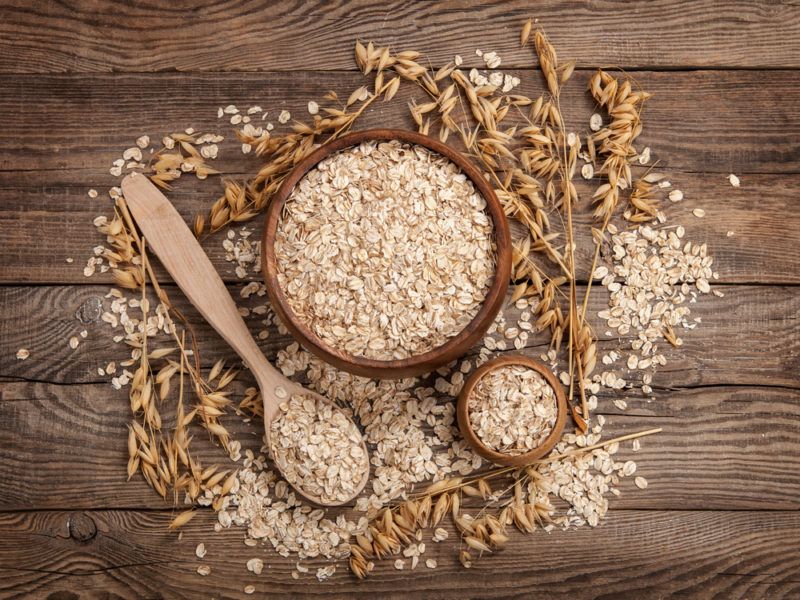
Eating oats regularly is a key recommendation for IBS sufferers. Oats are full of digestible fiber, which helps to decrease cholesterol levels and keep blood sugar stable. This fiber is also important for keeping your bowel movements regular and healthy – an outcome that is especially important for anyone with IBS.
Oatmeal is the easiest way to eat oats, as this is already a common breakfast choice for many people. You could also turn to overnight oats or baked products that contain oats. Raw oats are an option too, although these can be difficult to digest.
You’ll also need to be careful about what you’re eating at the same time. Oatmeal and overnight oats, for example, both often use milk as a source of liquid. But, dairy can be a poor choice for people with IBS and can aggravate symptoms. You may have better outcomes by relying on a plant based milk instead.
Plant-Based Milk
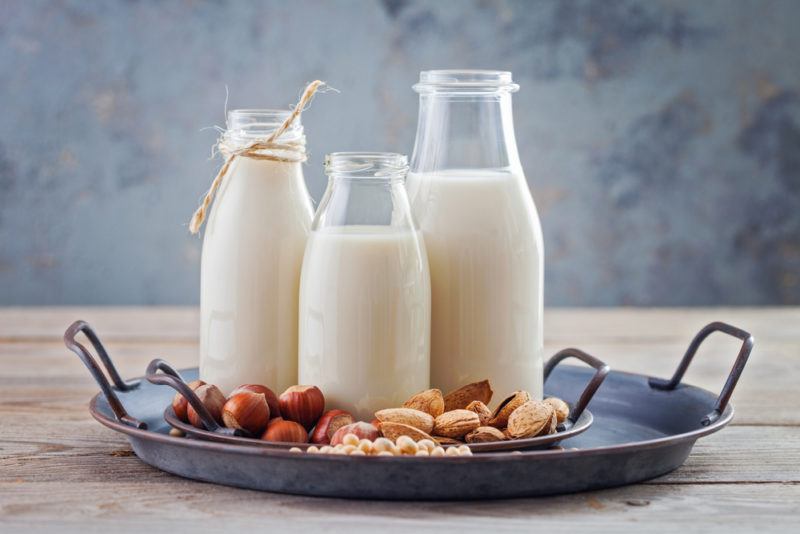
Changing from regular milk to plant based milk is one of the simplest ways to reduce IBS symptoms. The term plant based milk just refers to any milk alternative that is made from a plant source.
While plant based milk mightn’t be considered a food in its own right, the milk can be used as an ingredient in many different meals. In some cases, you may only need to change the type of milk to make a meal IBS friendly.
Lactose Free Dairy Products
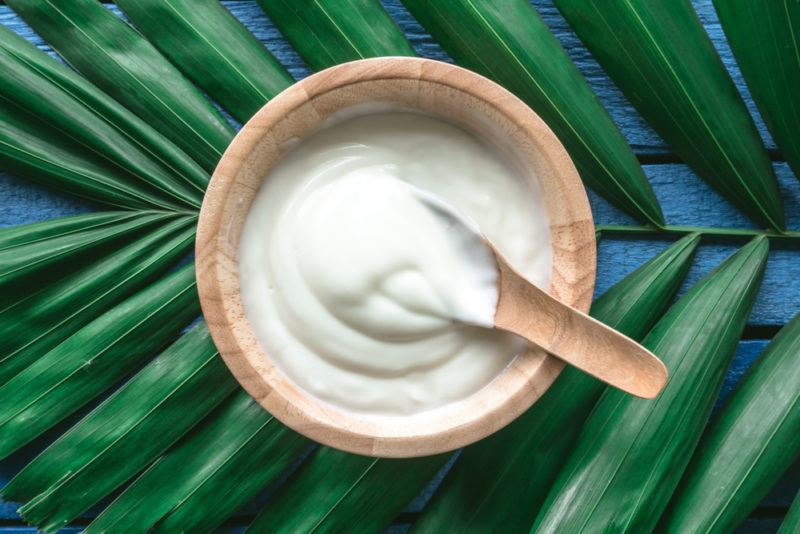
Many people don’t need to avoid dairy entirely, even if they get IBS symptoms from regular dairy products. You may be able to use lactose free dairy products instead. These are dairy foods that have been treated with the enzyme lactase. Lactase breaks down the lactose in the product, leaving the rest of the compounds intact.
This process is helpful for IBS sufferers, as the lactose in dairy is the FODMAP compound, not the other parts of the milk. Lactose free milk is the most common type of product. This has a similar nutritional profile, flavor, and texture to regular milk – making it a very easy ingredient to cook with.
The main difference is that lactose free dairy tends to taste slightly sweeter than dairy that contains lactose. This is due to differences in how our bodies perceive complex sugar versus simple sugars.
You may be able to find other lactose free dairy products too, such as lactose free cream cheese and sour cream. Using these is much simpler than trying to find a plant-based alternative.
Low Fat Dairy Products
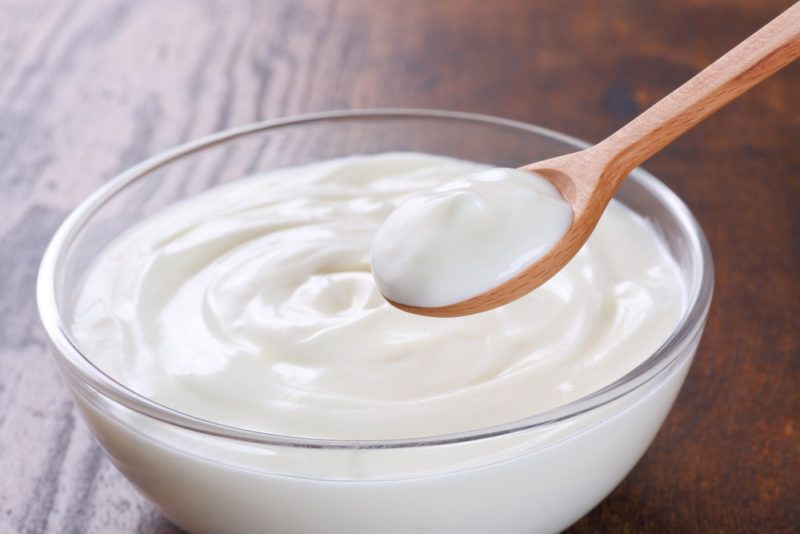
While lactose is generally avoided on a low FODMAP diet, many IBS sufferers can enjoy dairy without any symptoms at all. If this is the case for you, then low fat dairy is a good addition to your diet. After all, dairy contains a decent range of nutrients, including calcium.
Low fat dairy is generally preferred to higher fat options, as fatty foods can sometimes trigger IBS symptoms. Low fat dairy avoids that risk and could be better for your waistline too.
Yogurt and frozen yogurt are common recommendations, especially as these aren’t as rich as many types of cheese. If you are taking this route, pay attention to the products that you choose. Some dairy foods have high amounts of sugar, along with artificial flavors or colors.
If you’re eating yogurt, look for products that contain active cultures. The bacteria in these will use some of the lactose as a food source, which leads to a lower lactose food. Yogurt also tends to be better tolerated than many other dairy foods. So, even if you can’t eat other types of dairy, you may be okay with yogurt.
Cooked Vegetables
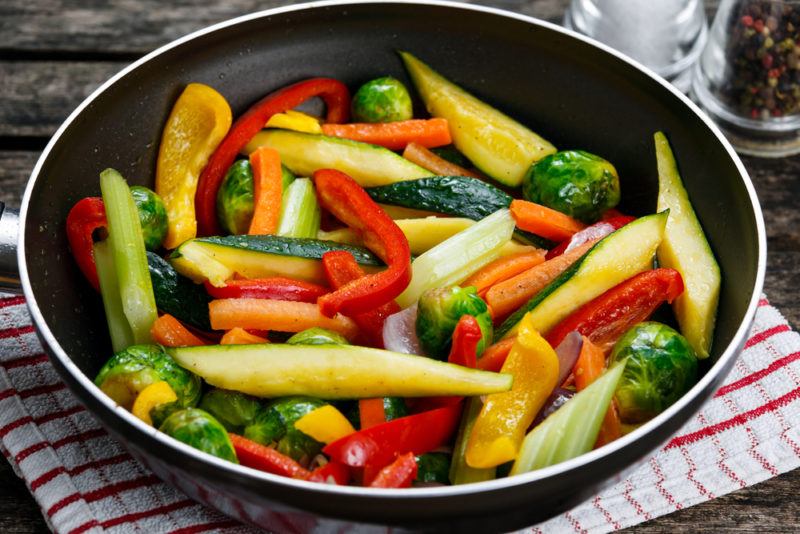
Most people with IBS can tolerate many types of cooked vegetables. The main exceptions are broccoli, cauliflower, and cabbage, which create more gas than other types of vegetables.
Experiment to see what works for you. Many people can enjoy broccoli, cauliflower, and cabbage as well as other types of vegetables.
And, if you find that a vegetable doesn’t cause you IBS symptoms, then including it in your diet does make sense. After all, vegetables offer important nutrients and plant-based compounds, while helping to improve your gut flora too. Skipping out on too many vegetables could even make your IBS symptoms worse.
If you do struggle with vegetables as an IBS sufferer, one approach is to start slowly. Focus on vegetables that are least likely to cause problems, such as bell peppers, carrots, sweet potato, eggplant, zucchini, and parsnip. You can expand to more difficult vegetables over time.
Cooking your vegetables rather than having them raw is important too. Raw vegetables are more difficult to digest, so they’re more likely to cause IBS symptoms.
Leafy Greens
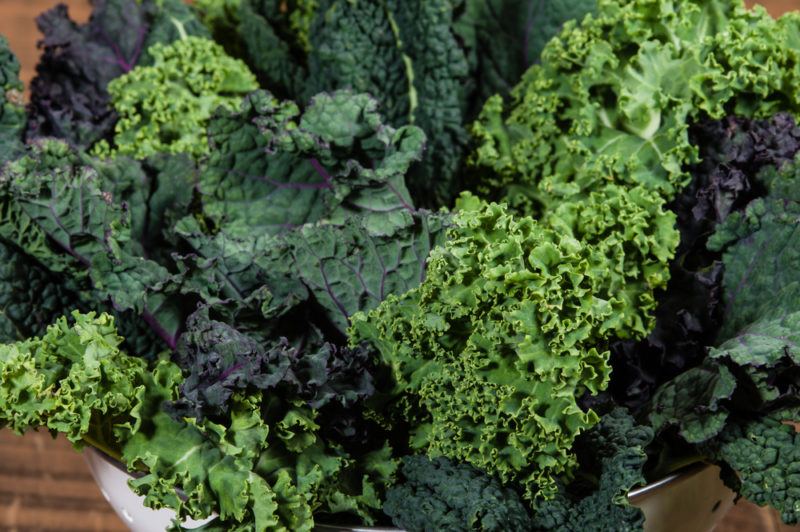
Leafy greens are a particularly important type of vegetable. And, thankfully, they tend to be well tolerated. Many people with IBS can even eat leafy greens raw. This means that you could include them in a salad or blend them into a smoothie.
If you get symptoms from the raw greens, try cooking them instead. Sauteeing the greens in olive oil is a simple and delicious way of cooking them.
Low FODMAP Fruit
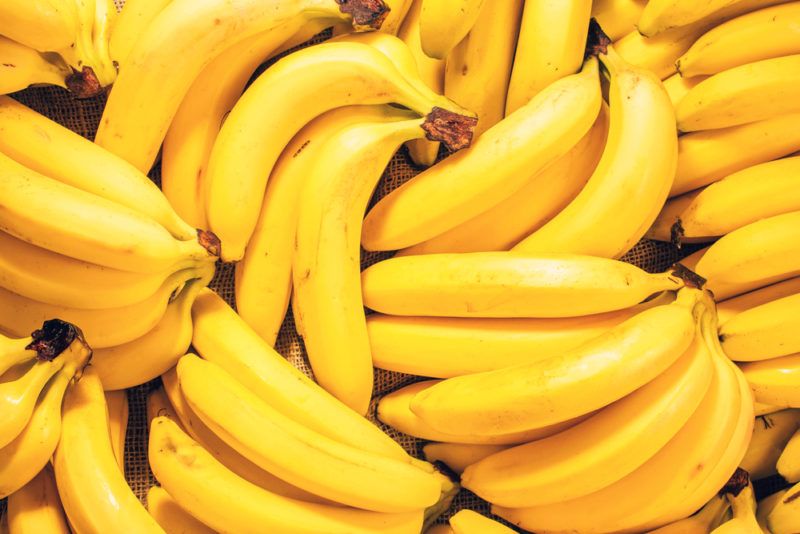
While some types of fruit can cause IBS symptoms, cutting fruit out of your diet isn’t a good idea either. As is the case with vegetables, fruit contains important nutrients and helps to maintain your gut health.
Focusing on low FODMAP fruit gives you the chance to get the benefits of fruit, without much discomfort. Key examples include bananas, blueberries, grapes, oranges, pineapples, and raspberries.
You may be able to enjoy avocado too, but you may need to keep your serving size small – perhaps an eighth of an avocado in a sitting. Avocados are rich in fat, after all, which could trigger IBS symptoms.
You should also keep an eye on the amount of fruit you eat at a time. If your serving is too large, your body might not be able to deal with all the sugar before some of it ferments. That fermentation is what you’re trying to avoid, as it leads to the IBS symptoms.
Fruit Without Skins
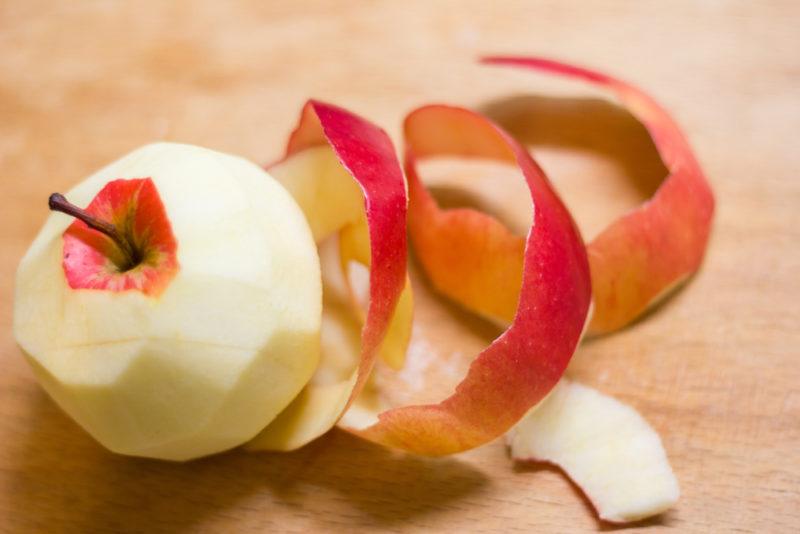
If you still have trouble even with low FODMAP fruits, try eating the fruit without its skin. You may find that this makes the difference.
And, once again, be sure to experiment and find what works for you. Doing so is crucial for fruits and vegetables, as reactions and recommendations vary so much. For example, oranges are sometimes considered low FODMAP fruits that you can enjoy with IBS. But, some authors suggest that IBS sufferers should avoid citrus fruit.
Rice Cakes
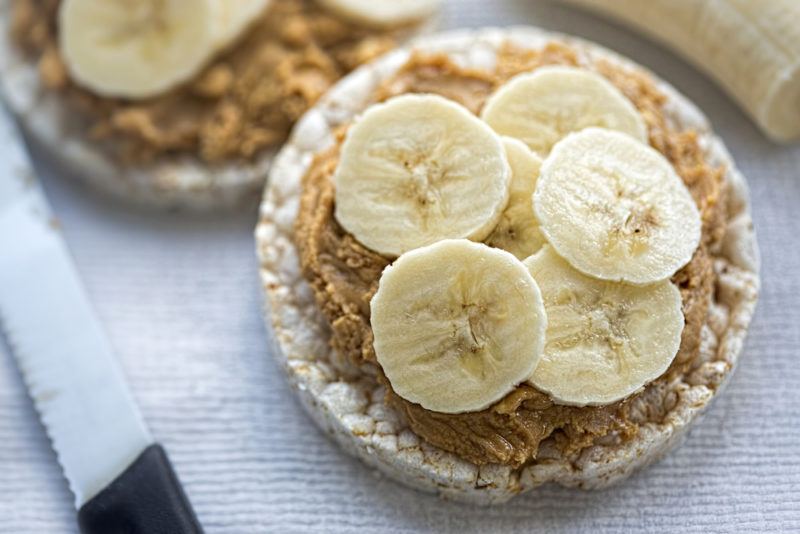
Rice cakes are low in fat and are mild, so they’re unlikely to contribute to IBS symptoms at all. They’re also an easy snack, which can be important, as waiting too long between meals can increase the risk of IBS symptoms when you do eat.
Of course, rice cakes aren’t especially nutritious either. Some people find that they’re a little like eating air.
Popcorn
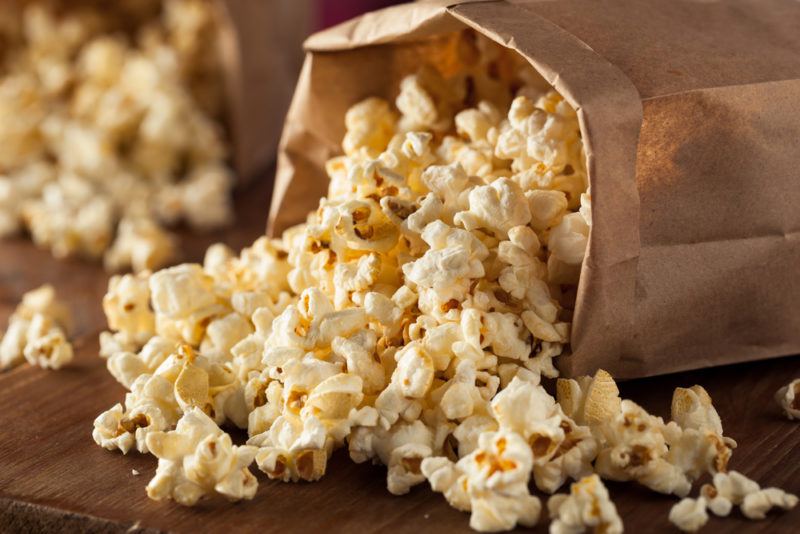
As long as you’re not loading on the toppings, popcorn is another easy IBS snack choice. The advantages are similar to rice cakes – you’re enjoying a low fat snack that’s pretty mild.
Nuts
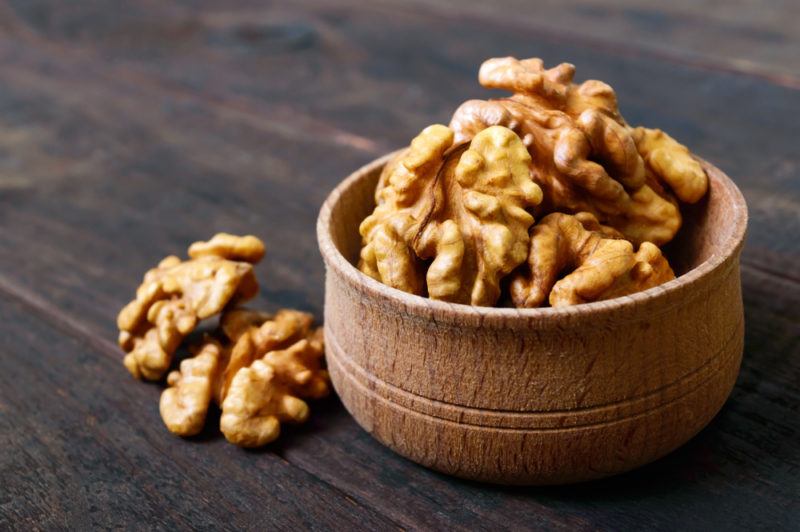
Despite their high fat content, nuts are suitable for many people with IBS. This is partly because they contain a decent amount of fiber and protein. Many are low in FODMAPs too. Walnuts, pine nuts, and pecans are all safe choices.
You can enjoy almonds and hazelnuts too, but you’ll need to be a little more careful with your quantities here. Try not to have more than ten almonds or hazelnuts per serving and you should be good to go.
Seeds
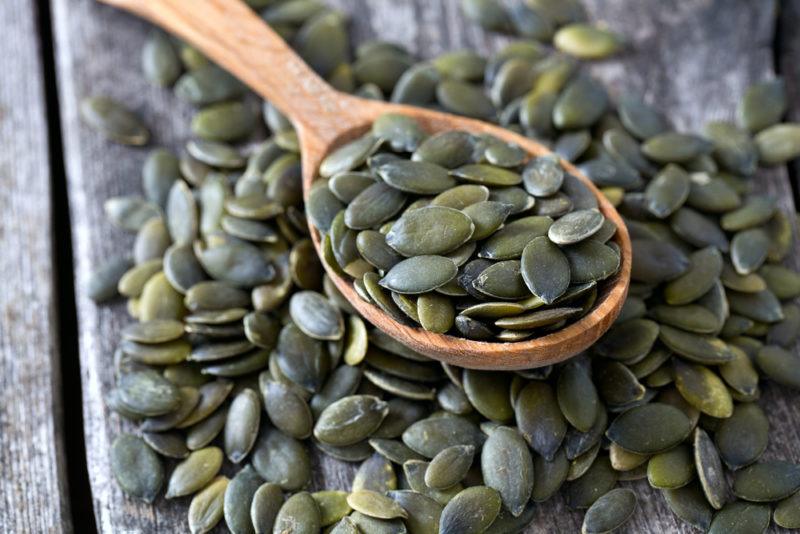
Some seeds can be included on an IBS diet too, including sunflower seeds and pumpkin seeds. These also act as a good source of protein and additional nutrients.
While these seeds are low in FODMAPs, responses do vary. Some people find that they are sensitive to the seeds, while others can eat them without any issue.
Bread
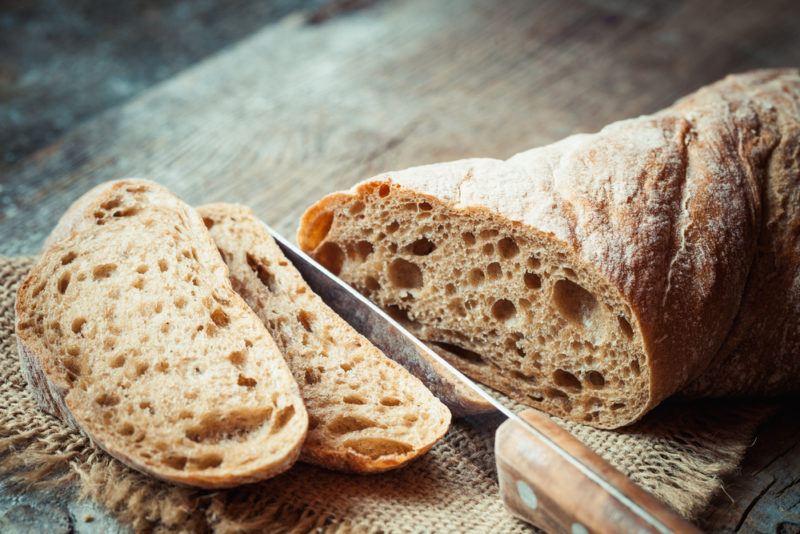
For the most part, IBS sufferers can tolerate bread of any type. This includes regular white bread, whole grain bread, and even gluten free breads. Bread products will often be safe too, such as bagels and perhaps even pastries.
However, this is one area that you will need to play around with and work out for yourself. For one thing, anyone who is sensitive to gluten will have problems with many types of bread. And, if you do get symptoms from eating bread, then you might not realize that you are sensitive to gluten.
Many lists of IBS foods suggest excluding gluten-containing foods anyway, which is the easiest approach if you are unsure.
The difference in recommendations highlights just how complex IBS is. There is no single IBS diet that works for everyone. Instead, people vary in which foods they are sensitive to.
Pasta
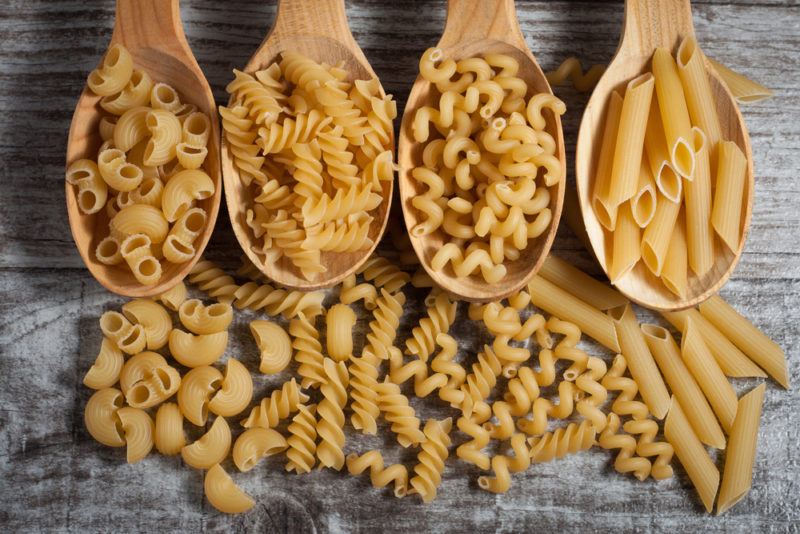
People with IBS can also enjoy pasta of whatever variety – and there are so many types to choose from. You will, however, need to pay attention to what you serve with your pasta. After all, some pasta meals are high in fat, while others rely on high FODMAP foods.
Thankfully, there are plenty of useful recipes out there too. You can start by searching for ‘IBS pasta recipes’ or ‘low FODMAP pasta recipes’. Both approaches will provide you with many recipes to be going on with.
Chicken
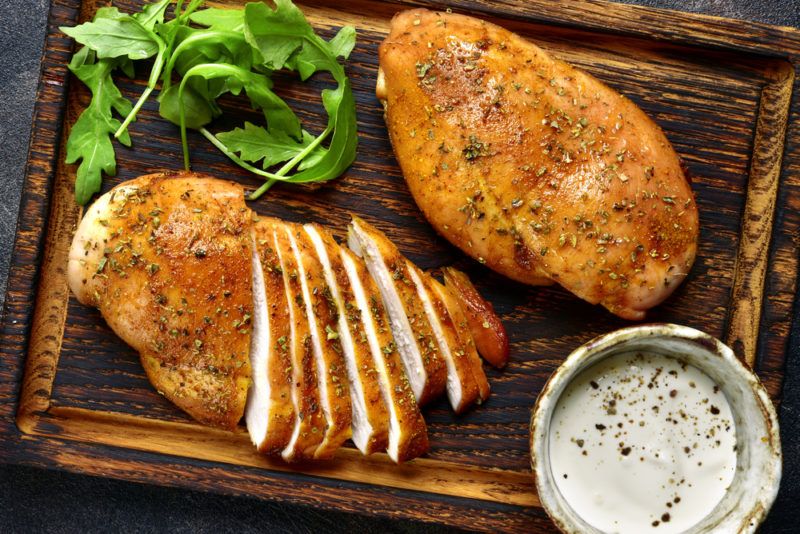
Meat tends to be a safe choice for IBS sufferers, especially if you’re focusing on lean cuts and avoid more processed options, like sausages or breaded meats.
Chicken is an easy place to begin, as chicken tends to be a lean source of protein. Chicken breast, for that matter, is a common food for dieters, partly because it is low in calories. The low fat content also makes chicken breast the best part of the chicken for anyone with IBS.
Chicken is also a versatile ingredient. You can use chicken in many different dishes. It’s even a common choice for meal prep, as well-seasoned chicken tastes just as good cold as it does warm.
Turkey
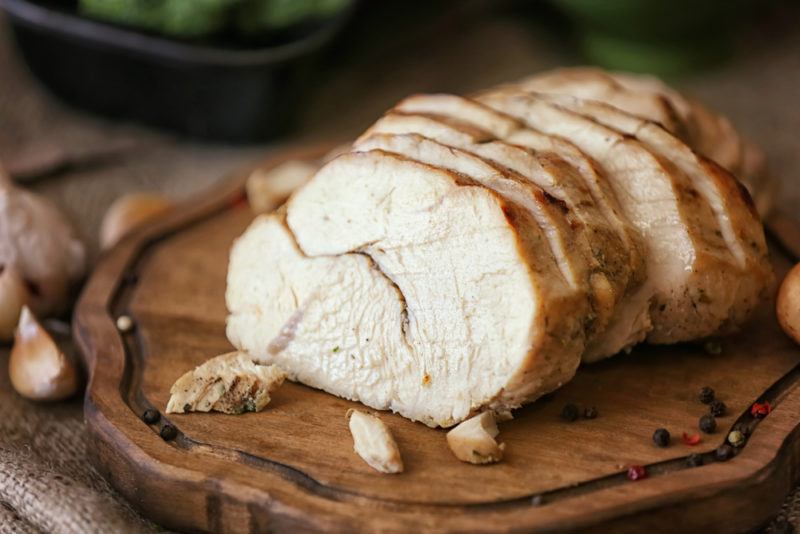
Turkey has the same advantages as chicken and can even have a similar nutritional profile. Chicken and turkey do vary a little in flavor, so some people prefer one over the other.
As far as IBS goes, either option will work well. Once again though, the white meat tends to be a better choice than dark meat – making turkey breast the most appealing part of the bird.
Lean Beef
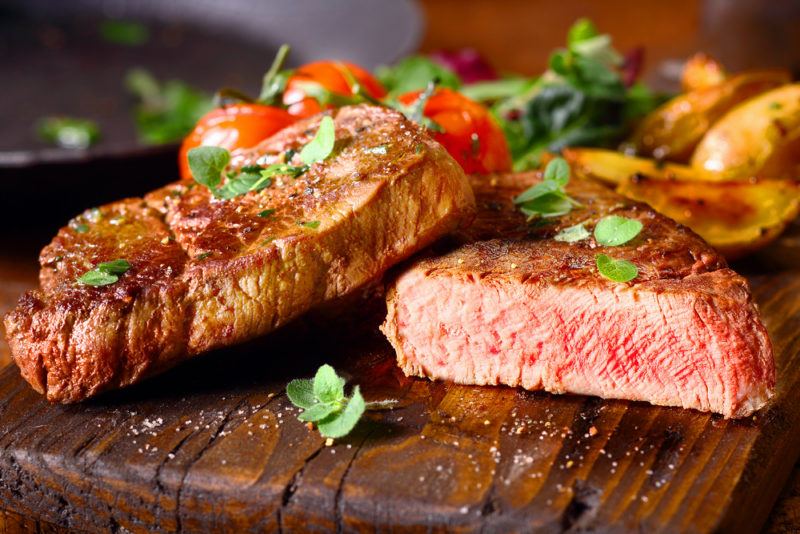
You need to be a little more careful with beef, as many cuts are high in fat. Some are marbled too, which makes the fat more difficult to avoid. Sticking to the lean cuts is the best way to keep yourself free of IBS symptoms.
Pay attention to how you cook the beef too. Relying on too much fat during cooking won’t be helpful.
Some theories suggest that you can choose fattier cuts of meat if they are grass-fed, pasture-raised, or free-range. Animals raised like this may have fewer toxins in their fat, which could reduce the risk of IBS symptoms. However, such ideas are speculative and may not come to pass in reality.
As always, you’ll need to try for yourself to learn what you can tolerate and what you cannot.
Other Types Of Meat
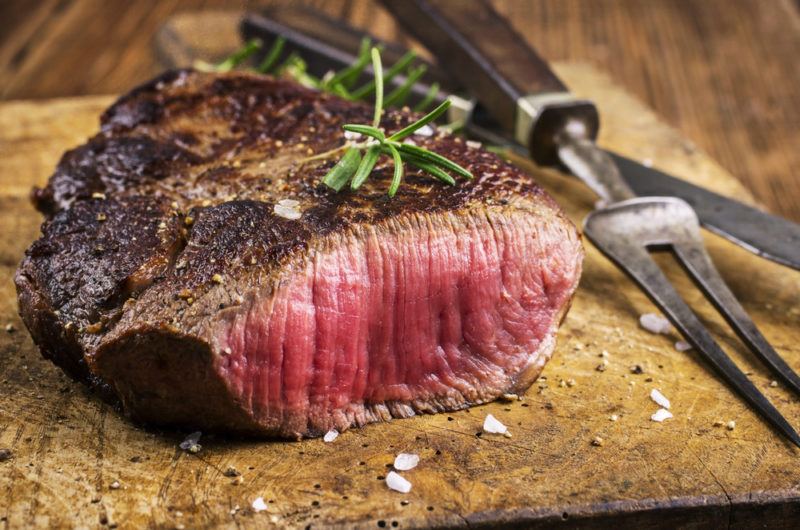
As long as you’re focusing on lean cuts, most types of meat can be included in your diet. This includes pork and lamb, along with more exotic cuts of meat like venison and wild game.
Wild game is a little harder to digest than regular other types of meat, so you’ll need to experiment for yourself. Still, it is worth trying, as exotic meats can taste amazing and each type of meat will have its own unique nutrient balance.
Cold Cut Meats
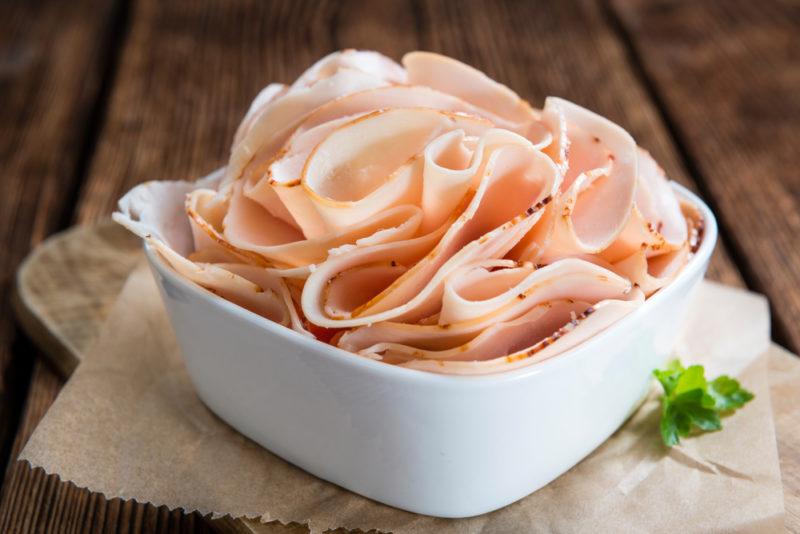
Not surprisingly, cold cut meats like ham, chicken, and roast beef are easy IBS choices. Steer clear of anything that is heavily processed or high in fat and you should be just fine.
It’s also important to check the labels for any unexpected additions. For example, you should be able to eat salami, but you’ll need to make sure that garlic isn’t used as an ingredient (it often is). If you can’t check the ingredients label, then it’s often safest to simply skip the salami.
Eggs

Eggs are another easy and safe choice for protein. They’re particularly good for IBS sufferers, as eggs are easy to digest. Eggs are nutrient-dense too, which is another reason for relying on them.
Another advantage is that there are so many different ways to prepare eggs. Hard boiled, soft boiled, and poached are all easy choices if you want to avoid frying anything.
You’ll also find egg-based meals on the menus of most cafes and restaurants, making eggs perfect when you are out and about.
You will need to experiment for yourself, as some people do experience IBS symptoms with egg whites. Others find that egg yolks are problematic instead, due to their high fat content.
Fish
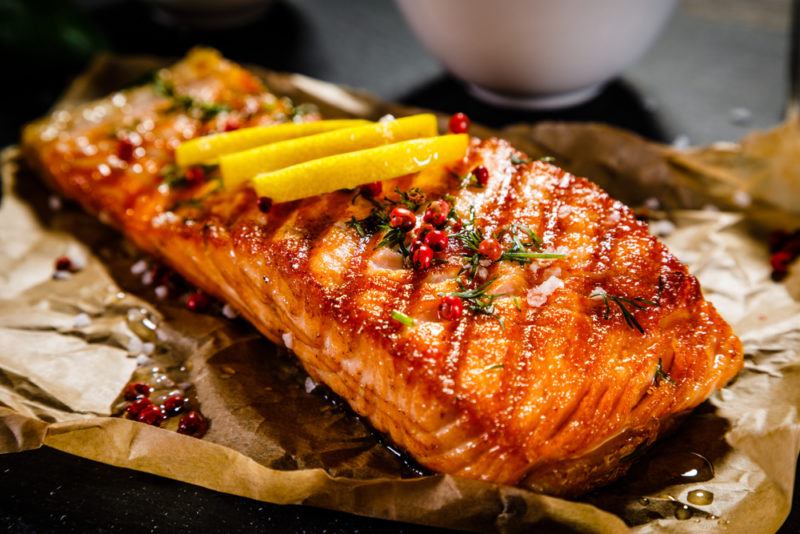
Many IBS sufferers don’t get any symptoms from fish. This is fantastic, as fish is the single best source of healthy omega-3 fatty acids.
Getting omega-3s in your diet regularly could even help with your IBS symptoms, as omega-3s may decrease inflammation and inflammation has been linked to IBS symptoms.
There are many different types of fish to choose from too. Salmon is a popular choice, as it is a meaty fish that is rich in protein and other nutrients. Wild caught salmon is the ideal choice, although many people choose farmed salmon instead because of the price difference.
Don’t worry if you’re not a fan of salmon. other types of fish can be just as appealing, including white fish, sardines, herring, and even anchovies.
Seafood
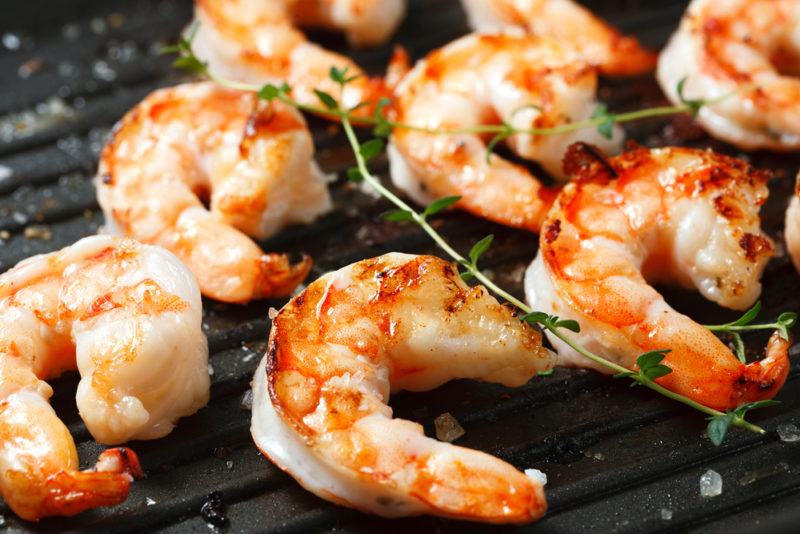
Seafood is just as safe as fish on an IBS diet. This includes examples like shrimp, prawns, mussels, and crab.
Seafood is also appealing because you’re eating a type of whole food, where there aren’t likely to be extra ingredients used. You will have to be careful if you’re ordering a seafood-based meal while you’re out for dinner, of course, but if you’re cooking at home, creating a delicious and safe meal should be easy.
Smoked Salmon
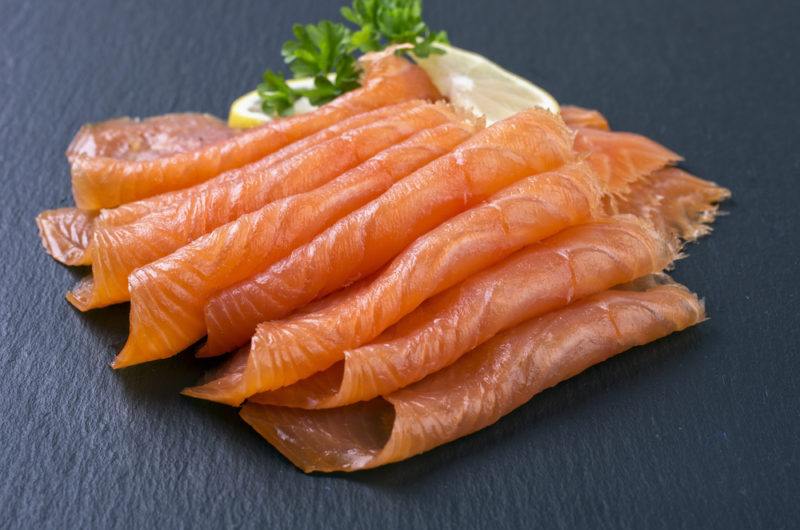
Smoked salmon deserves a special mention, as this is an easy and delicious way to enjoy salmon. There is no prep work or cooking to worry about. You can simply use the salmon as-is.
The ease of use makes smoked salmon a perfect choice for breakfast, helping you to get more protein and healthy omega-3 fatty acids. You can also easily use smoked salmon to create low FODMAP appetizers for parties.
Cheese
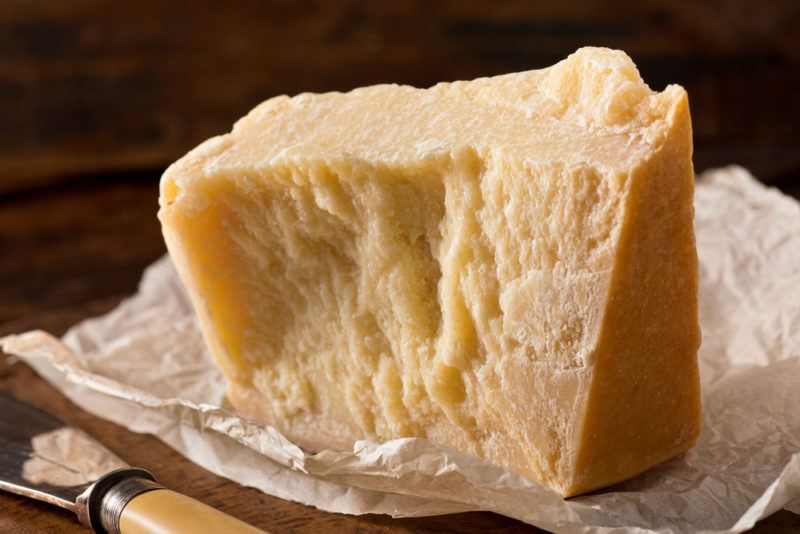
Many people with IBS can tolerate small quantities of cheese, especially if you focus on the low lactose varieties. After all, lactose is the FODMAP aspect of dairy and the amount of lactose present isn’t always the same.
Aged cheeses tend to contain less lactose than other types. The longer the cheese has been aged, the less lactose.
Some types of aged cheese only contain trace amounts of lactose, making them ideal for anyone who is very sensitive. Parmesan is one good example of this.
You may also be able to tolerate some other types of cheese, including options like brie or camembert. However, you will need to experiment to find the right options for you. Fresh cheeses like feta and mozzarella tend to be the worst choices and will often have the most lactose.
Sweet Potatoes
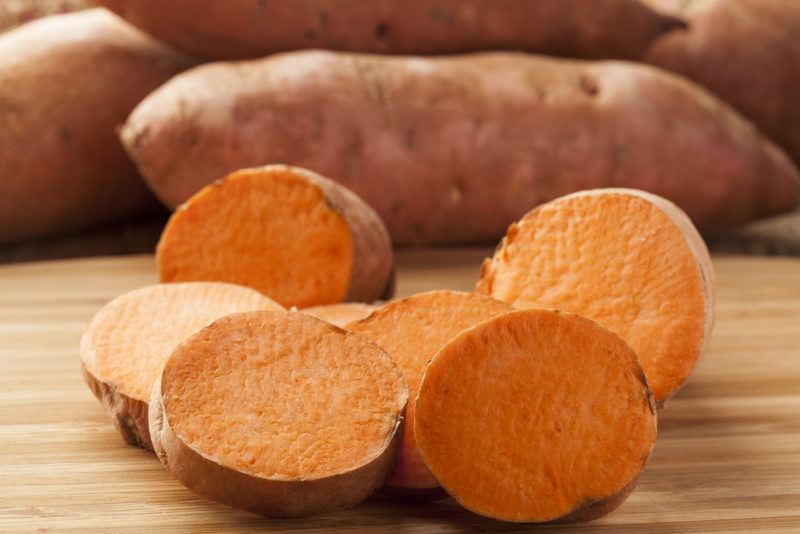
While sweet potatoes do have some FODMAPs, you can eat sweet potatoes with IBS, as long as you keep your portion size in check. A common recommendation is to have no more than half a cup of sweet potatoes in a serving.
This may not sound like a lot, but the serving size is large enough to still provide you with important nutrients from the sweet potatoes and to stop it feeling like you are missing out.
Potatoes
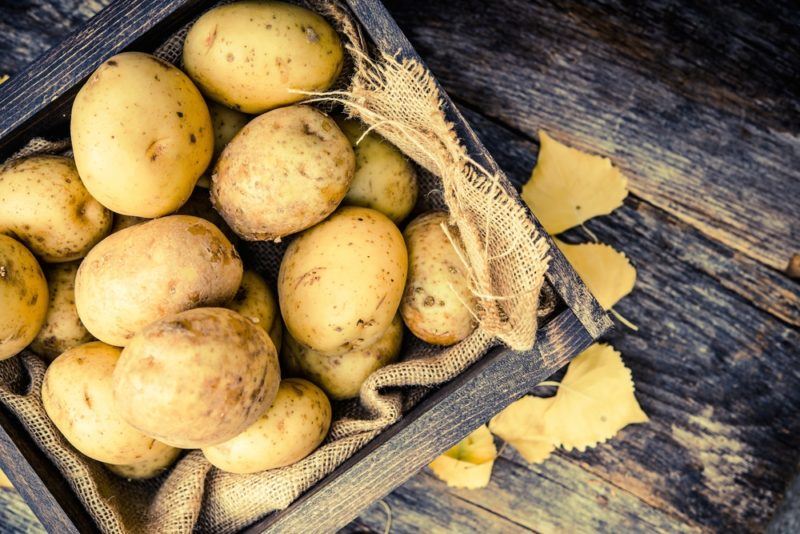
Regular potatoes are naturally low in FODMAPs, which is good news. After all, we do use potatoes in so many different ways. It would be a shame to have to cut them out.
However, there is the same serving size caveat with potatoes as with sweet potatoes. You’ll generally want to eat no more than half of a medium potato in a single sitting.
Rice
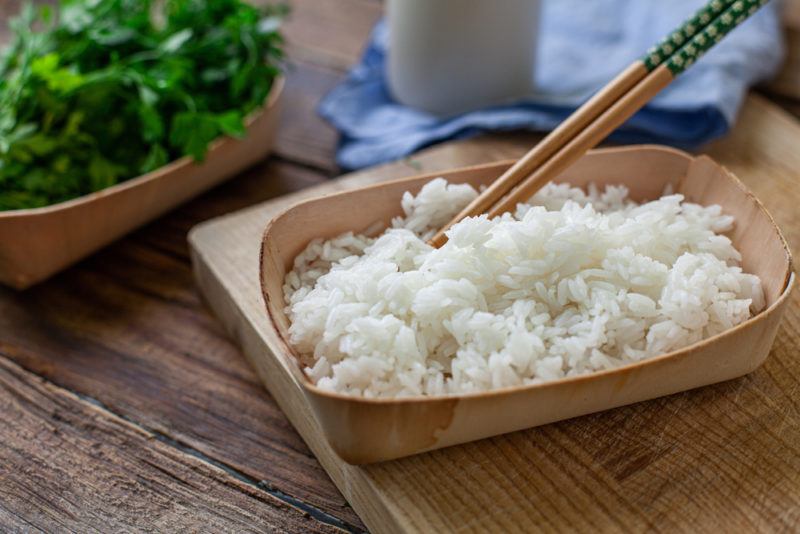
Rice is another classic food that you can still eat without any concern. This is true for white rice and brown rice, which gives you the chance to choose your preferred type.
The way you cook the rice doesn’t matter, but you will need to pay attention to what you serve with it. For example, beans, onion, and garlic are all common ingredients in rice dishes, but none of these is good for anyone on a low FODMAP diet.
Quinoa
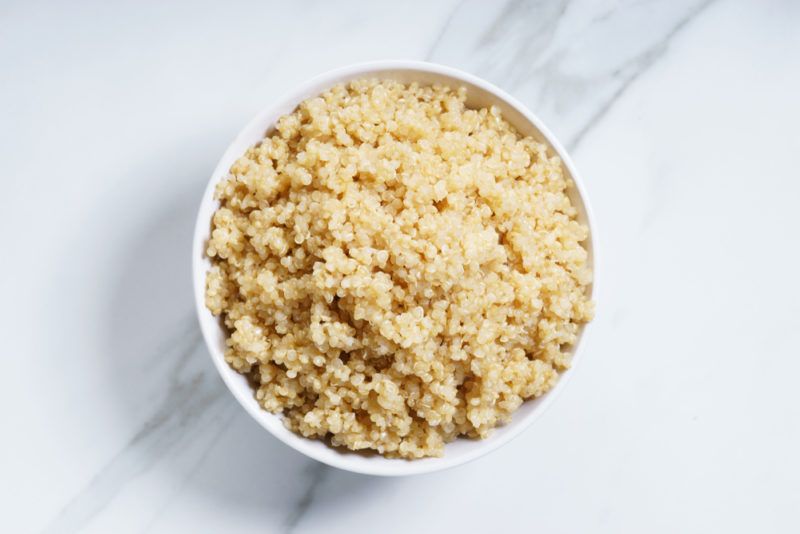
Conventional grains aren’t the only safe bets for IBS sufferers. You can also turn to options like quinoa. Quinoa is often considered to be a pseudocereal because it isn’t technically a grain but we eat it in the same way as a grain.
Quinoa has become popular recently as a superfood – because it is packed with nutrients and includes a decent amount of protein. Plus, quinoa has more nutrients and flavor than rice, and you can easily use it instead of rice in a meal.
You could also consider other types of pseudocereal, like millet. While you will need to experiment to find the best options for you, pseudocereals are unlikely to cause strong IBS reactions.
Tofu
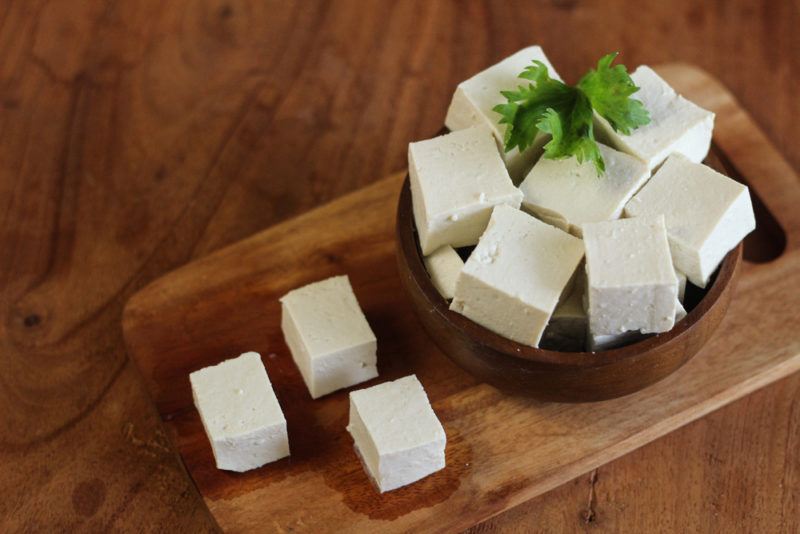
Soybeans are high in FODMAPs, so you’ll normally be skipping them if you have IBS. However, some products that are made from soybeans actually end up low in FODMAPs.
This is the case for tofu, as most of the FODMAPs end up being removed during the production process.
But, the type of tofu that you choose matters. A block of tofu tends to be low in FODMAPs, as part of the production process involves pressing the block and draining off excess liquid. That liquid is where you find the FODMAPs. This is true for extra firm, firm, and soft tofu.
Silken tofu, on the other hand, doesn’t involve draining off the liquid. You end up consuming all of the compounds from soy milk. As a result, you’ll need to avoid silken tofu entirely.
Tempeh
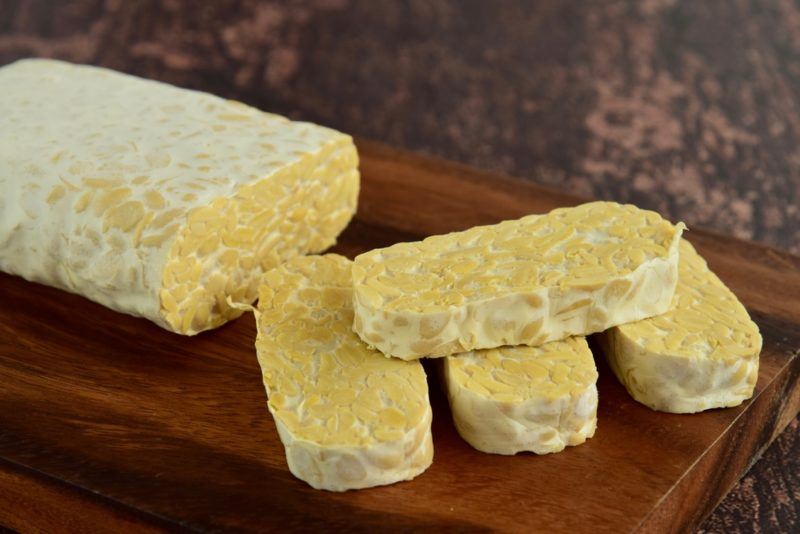
You may also be able to eat tempeh if you have IBS. While tempeh is made from whole soybeans, it is a fermented food. The fermentation process breaks down some of the FODMAP compounds, making this a good choice.
You may also find tempeh more appealing than tofu, as it has a more interesting texture and a somewhat nutty flavor.
The fermented nature of tempeh could help with IBS symptoms too. Fermented foods like this can help to improve the balance of bacteria in your gut. Doing so may help to improve your ability to digest food and make you less sensitive to trigger foods.
Quorn
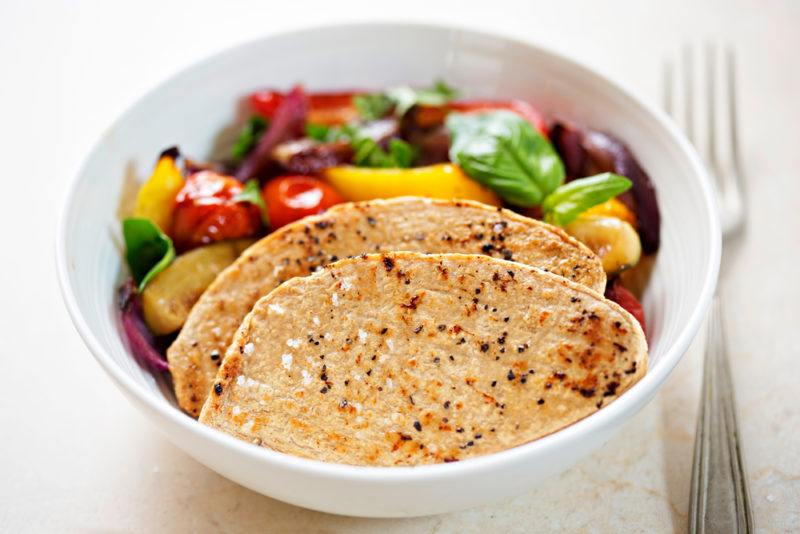
Quorn is an interesting vegetarian protein source that is sometimes vegan friendly too. The food is basically a meat alternative that is created from a soil mold. The use of mold makes the meat alternative highly controversial, to the point that there have been attempts to get it banned.
Quorn is still sold in the United States, although it needs to have labels to identify that it uses mold as a key ingredient. Quorn is not even officially available in Canada, as it isn’t considered a food source. Yet, Quorn does remain popular in the UK and is often through to be healthy.
Controversy aside, Quorn is a low FODMAP choice, one that IBS sufferers may be able to enjoy. A subset of consumers do experience side effects from the products, including symptoms like vomiting and nausea. While such side effects are rare, they do suggest that you start with a small amount of Quorn and work your way up from there.
Zucchini
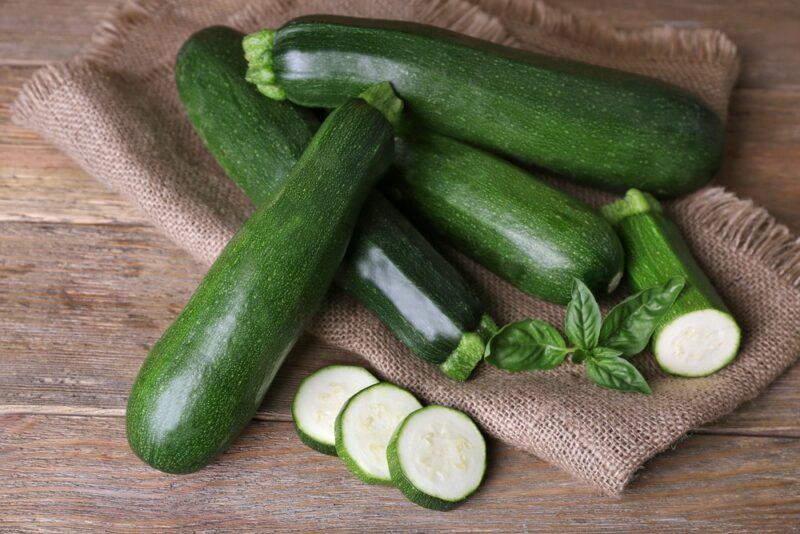
It’s easy to avoid veggies when you have IBS, as some of them can make IBS symptoms much worse. However, cutting veggies out isn’t the answer, as they contain many important nutrients and fiber. Eating vegetables regularly could even help reduce IBS symptoms in the long term.
The trick is to choose the right vegetables. Zucchini is a good place to begin. This summer squash doesn’t tend to be gas forming and is easy to digest. Yellow-skinned summer squash is even lower in FODMAPs than zucchini, so it’s another great option.
If you struggle with zucchini (or any of the foods on this list), try starting with small amounts and gradually increase your servings. You’ll often find that your body adjusts over time.
Carrots
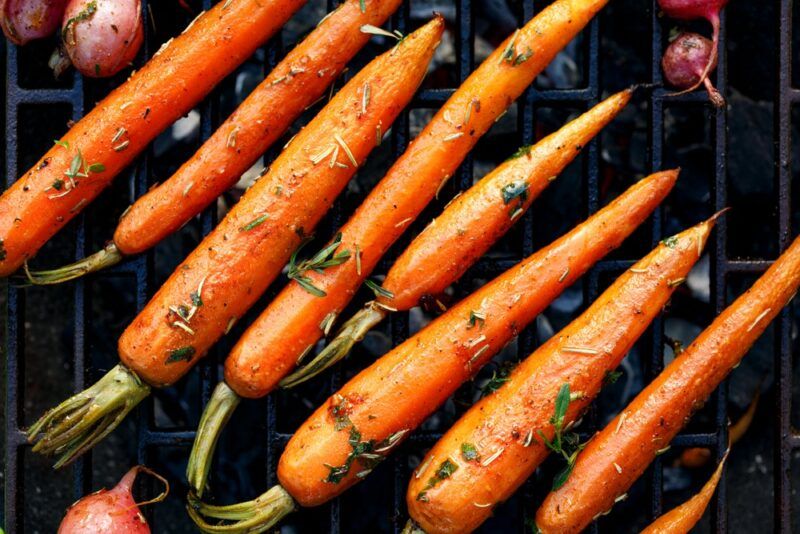
Carrots are another easy to digest vegetable, especially if you cook them first. Carrots even feature on a low fiber diet, which proves how digestible they are.
That’s not all. Carrots are particularly good for your health, partly because of the beta-carotene they contain. This is a pigment molecule that also functions as an antioxidant and has many health benefits.
If you struggle with carrots, try peeling them and cooking them first. Those steps make carrots even easier to digest. You can also include them in other dishes, like soups and stews.
Tomatoes
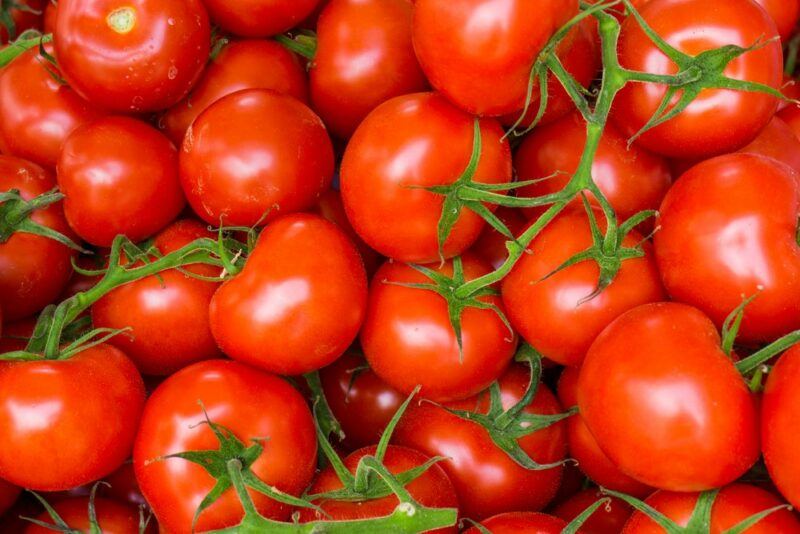
Tomatoes can be included on IBS as well, although you need to be a little cautious with the serving size here. For fresh tomatoes, you’re looking at roughly half of a small tomato. This mightn’t sound like much, but it’s still enough to use in some recipes.
For canned tomatoes, you’re looking at a serving of around half a cup. Some people may be able to consume more without issue, but it will take some experimentation to find out what your tolerance is.
Many tomato products fit onto a low FODMAP diet too, including tomato sauce and tomato paste. You’ll need to watch your serving size here too, but that almost goes without saying. Also be cautious with highly processed tomato products, including tomato ketchup in the United States, as these are often sweetened with fructose.
Bamboo Shoots
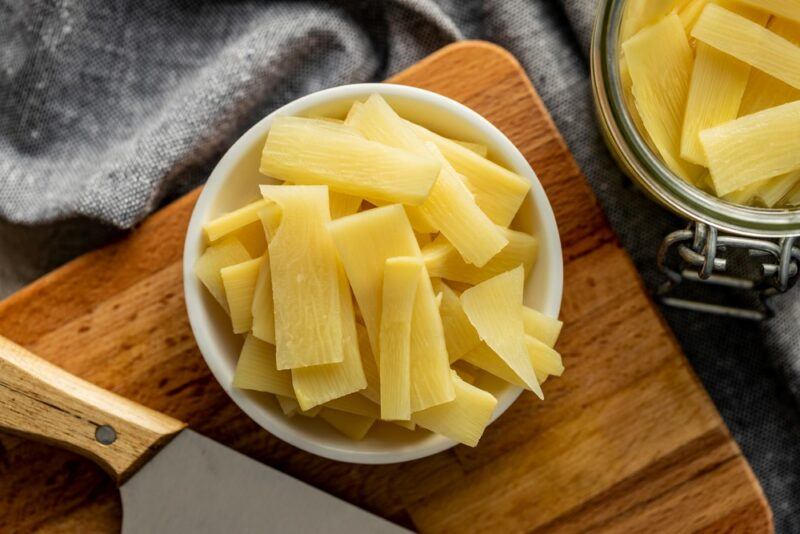
Bamboo shoots are a slightly unusual ingredient, but they’re still worth considering. A normal serving size of these is typically low in FODMAPs, even if you’re choosing a canned version.
The shoots could even help with IBS symptoms because of their high fiber content. While this might seem surprising, remember that you need fiber for your digestive system to function well.
Squash
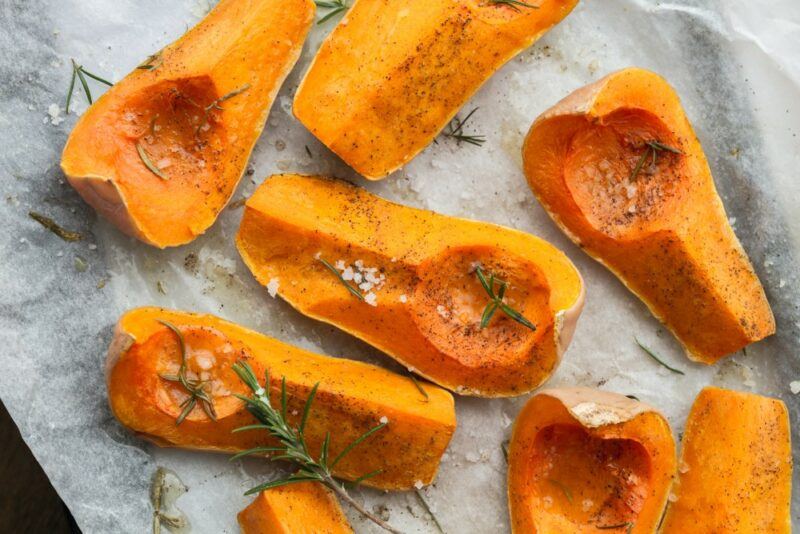
It’s not just summer squash that is viable on an IBS diet. Winter squash can work well too, including pumpkin, butternut squash, and other types.
You’re generally looking at a serving size of around a third of a cup to keep within your FODMAP needs. It’s important to double check though, as the low FODMAP serving varies from one type of squash to the next.
Interestingly, Monash records no detectable levels of FODMAPs in kabocha squash, which could make it the best choice (if you can find the squash). Still, it’s best to be cautious, especially when you first introduce the squash into your diet.
Kefir
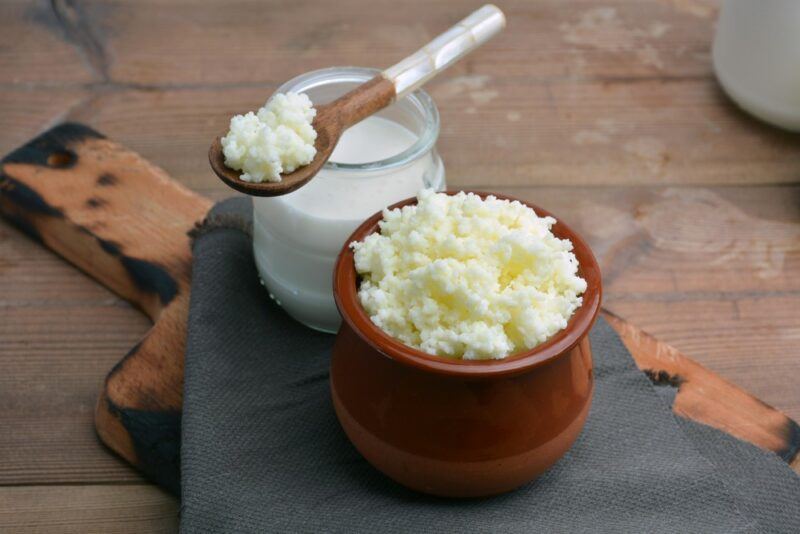
Kefir can be a fantastic source of nutrients and probiotics. The probiotics are particularly relevant when you deal with IBS. Getting enough probiotics might even help to improve your digestion and heal your gut.
However, there’s some debate about this fermented drink, because of the lactose found in milk. Some theories suggest that kefir is low FODMAP because much of the lactose is removed during fermentation. Others suggest that there’s still a decent amount of lactose.
Still, you can easily get around the lactose issue. Simply look for kefir that has been treated with lactase. The lactase enzyme breaks down lactose just like it is meant to in your body – so the lactose shouldn’t impact your IBS at all. You may also simply need to experiment and see whether your body can handle kefir.
Kimchi
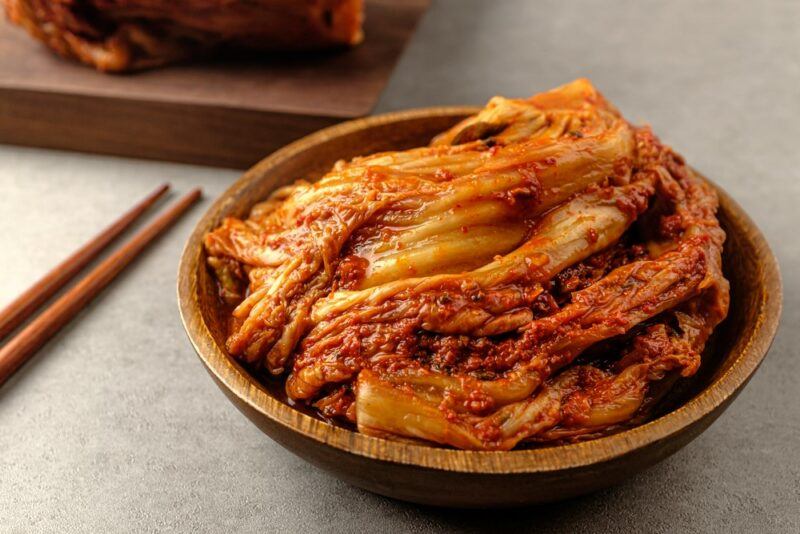
In case you’re unfamiliar, kimchi is a traditional fermented Korean dish. It generally relies on a collection of vegetables, along with plenty of flavoring ingredients.
Kimchi is generally a low FODMAP food. And, like kefir, it’s an excellent source of probiotics. You’re also getting plenty of fiber, which is important for your long term gut health.
However, it’s important to be cautious, particularly if you’re buying kimchi rather than making it yourself. Store bought kimchi sometimes uses high FODMAP ingredients, such as garlic. Checking the ingredients label should help you to find versions that don’t set off any side effects.
IBS Lifestyle Tips
Managing IBS symptoms goes beyond simply eating low FODMAP foods and avoiding high FODMAP ones. There are other important approaches too, including the following.
- Eat regularly and try not to delay meals or skip them.
- Get enough fiber. Consuming between 25 grams and 30 grams of fiber per day helps with long-term IBS improvement.
- Be cautious with fatty or spicy foods, as both can aggravate your symptoms. This often means you should focus on low fat alternatives.
- Focus on lactose free or dairy free milk whenever possible.
- Cook your own meals, focusing on fresh and whole ingredients. If you need to buy meals, look for minimally processed products, ones with few additives and no concerning ingredients.
- Look for ways to decrease stress, as stress can have a strong impact on IBS symptoms.
- Exercise regularly.
- Limit your intake of caffeine, soda, and alcohol.
- Eat slowly and mindfully. Eating too quickly can aggravate symptoms, even if you’re focusing on low FODMAP foods.
- Watch your portion sizes. Many of the foods on this list are only low FODMAP if you keep within the recommended serving size. This serving size is often relatively low and it’s easy to accidentally go above it.
Foods To Avoid With IBS
As you can see, there are plenty of food foods for IBS, ones that will help your body and shouldn’t cause unwanted side effects. There are also some groups of foods to be very cautious with, including the following:
- Cruciferous vegetables. This category includes vegetables like brussels sprouts, cauliflower, and cabbage. Cruciferous vegetables are challenging because of a compound called raffinose that gets fermented before our bodies digest it, leading to excess gas.
- Beans. Legumes often lead to gas, due to the presence of oligosaccharides and antinutrients, plus a high fiber content. Beans are particularly bad and are best avoided if you have IBS.
- Onion and garlic. Onion and garlic deserve a special mention, as both can promote IBS symptoms. They’re notable because they’re regularly used as flavor ingredients, sometimes when you don’t expect them.
- Fried food. The high fat content of fried foods makes them a no-go for IBS sufferers. Many of these foods have other issues too, like being high in sodium and sugar. If you love the flavor and texture of fried food, try making healthier versions at home using an air fryer.
- Processed foods. These foods are often unhealthy, as they tend to be high in fat, sodium, sugar, and calories. There are also plenty of additives, ones that can easily set off IBS symptoms. While there are some healthy options, it’s generally best to focus on minimally processed options, preferably meals you make yourself.



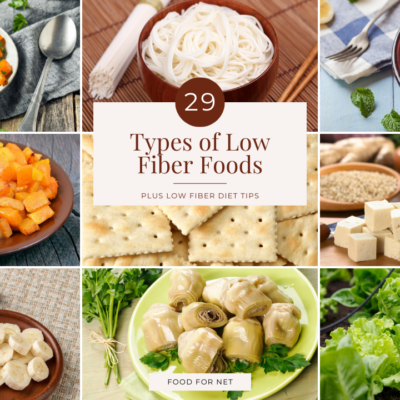
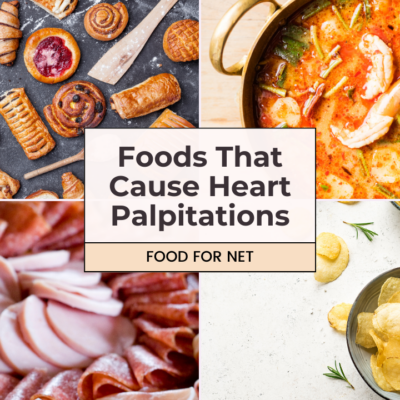
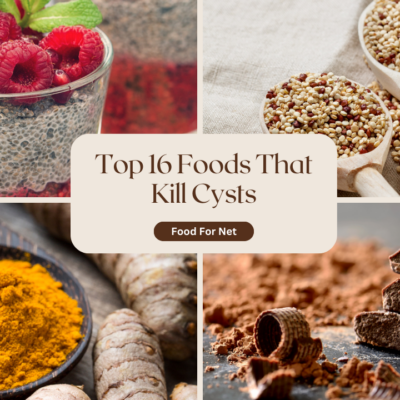
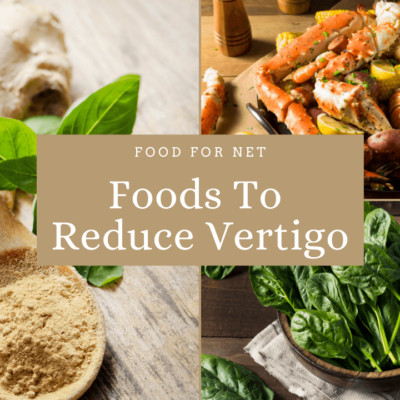
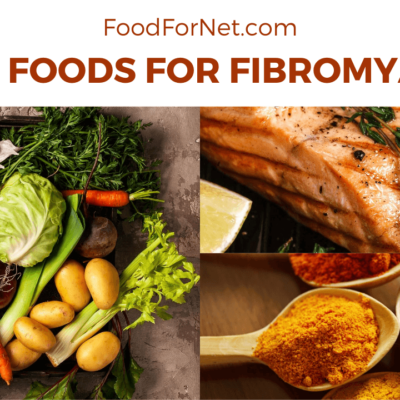

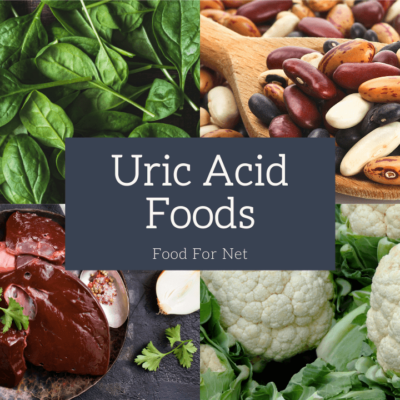

 36 No Shaker Cocktails That Are Easy To Make And Delicious
36 No Shaker Cocktails That Are Easy To Make And Delicious
Great article for anyone who suffers from IBS. I love the long list of safe food choices. I am thankful for reading foods that I should not eat
Great Article! Certainly helped me choosing the right product for IBS. Life changing, thankyou for this very important information.
I agree this is a great article and the list of food choices made easy. I suffer with really bad IBS and triggers can change which makes it even more difficult for unexpected flare ups.
Thank you for making it easy!
This article is hilarious, they pretty much listed every food as being ok for ibs including gluten containing foods like pasta and bread not to mention apple which are a well know trigger.
Depends. “Some people with IBS may tolerate pasta just fine, but certain susceptible individuals can develop symptoms [after eating pasta].”
Does that mean that linguine and fettucine and mac ‘n’ cheese are forever banned from your plate? Probably not.
“Often, for those who may experience symptoms after having pasta, it can also depend on the amount consumed,” Krikhely says. “Eaten in smaller portions, like a half-cup cooked, it may be tolerated, while larger servings may lead to gastrointestinal discomfort.
Regarding apples, they were not explicitly listed here. There was a picture to represent fruit without skin. IBS is not limited to diarrhea, and apples can be beneficial if you are experiencing IBS constipation.
This article is excellent. I have horrible ibs . Thank you for this list of foods that can be tolerated. I really appreciate it.
The best help I have ever received after many years of struggle.
May not work for everyone, but this is right for me.
I’m very grateful.
I have terrible IBS, pasta (all types) are a no-no as well as bread (white or brown), the problem here is I like the foods that irritate. But the list was very helpful, especially the fruit without the skin. Will definitely be trying that. Already consuming child sized portions, but find hunger pangs tend to come from this, so still working out what are the right beneficial portion sizes.
Thank you, for the time and effort put into this blog,. it was very much appreciated.
Thanks for this article, I found it to be very good. I get all the IBS symptoms, but have not been diagnosed as very difficult to get doctors appointment,. I Am just staring on the FODMAP eating routine. Hoping for good results.
eggs, leafy greens, bread, pasta make me Die….